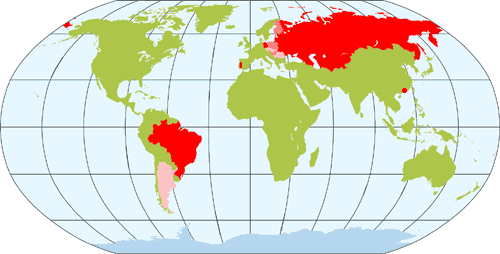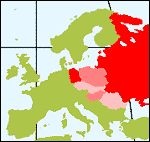|
Clones
and variants
Clones
| Variants
Clones
The simple design of the ZX
computers made them easy machines to pirate. Within only a
few years of the launch of the ZX81 and ZX Spectrum, a huge
number of illegal clones had been produced around the world.
The map below shows the countries in which cloned Sinclair
computers were produced:

(Based on National Geographic Society mapping)
There were three clusters of
clone-producing countries, each market having developed for
rather different reasons.
South America
Sinclair computers were not
officially distributed in South America, but were available
as expensive "grey imports". However, weak intellectual
property laws allowed Brazilian and Argentinian manufacturers
to produce near-identical copies of the Timex and Sinclair machines.
Hong Kong / China
Sinclair computers were available
officially in Japan, via a distribution agreement with Mitsui
(which specialised in importing British goods into Asia, such
as Jaguar cars and Burberry raincoats). However, as in South
America, a lack of official distribution and weak IP laws
allowed local manufacturers in Hong Kong to produce clones
of Sinclair products. Although they were successful, they
were soon displaced by a wave of cheap Japanese and Korean
home computers based on the now-defunct MSX standard.
Eastern Europe
 By
far the biggest numbers of clones of Sinclair computers were
produced in countries behind the Iron Curtain, particularly
in the Soviet Union. More types were produced in the USSR
than in the rest of the world combined, but Sinclair clones
also appeared in Poland, East Germany, Czechoslovakia, Hungary
and Romania. By
far the biggest numbers of clones of Sinclair computers were
produced in countries behind the Iron Curtain, particularly
in the Soviet Union. More types were produced in the USSR
than in the rest of the world combined, but Sinclair clones
also appeared in Poland, East Germany, Czechoslovakia, Hungary
and Romania.
During the Cold War, high technology
exports to the communist bloc were strictly controlled by
Western countries, out of fear that Western technology would
be used or reverse-engineered for military purposes. This
made it very difficult and expensive to obtain Sinclair machines
legitimately. In the USSR, at a time when the average monthly
income was just 250 roubles a month, a Spectrum cost 40,000
roubles - equivalent to 13 years' wages. Despite this or perhaps
even because of this, a technologically literate population
wanted access to home computers. A near-complete lack of IP
laws meant that clones proliferated rapidly.
Unlike the more-or-less straight
copies produced in South America and Hong Kong, eastern European
Sinclair clones were often heavily re-engineered. Many included
features which Western Sinclair owners would have given their
back teeth for, such as more memory, faster processors, disk
drives - even hard disks - and proper full-size keyboards.
Remarkably, even though the
Spectrum effectively died out in the West in the early 1990s,
Spectrum clones are still being made in eastern Europe and
a thriving user community is still producing software.
Variants
Legal licensed variants of
the Sinclair computers were also produced in a number of countries.
Most obviously, Timex
in the United States produced a number of machines based on
(or rebadged versions of) Sinclair's UK computers. In Britain,
Miles Gordon Technologies produced the Spectrum-compatible
Sam Coupé
following Amstrad's 1986 buyout of Sinclair. The only other
place in Europe where legal Spectrum clones were produced
was Spain, where Sinclair's partner company, Investronica,
produced a version of the Spectrum+ and Spectrum 128. Semi-legal
variants were produced in Portugal by, ironically, Timex:
the company's local subsidiary survived the US parent's collapse
and produced a number of unauthorised "Timex Computer"
clones of the Timex/Sinclair machines.
The Sinclair QL reappeared
in radically altered form as the ICL One
Per Desk (also marketed as the British Telecom
Merlin Tonto and Australian Telecom Computerphone), an innovative
all-in-one desktop business communications system. After Amstrad
dropped the QL from the Sinclair range, the machine was redeveloped
as the CST Thor. The QL later saw another redevelopment in
the shape of the Q40, produced by Peter Graf.

Back
to top
© Chris Owen 1994-2003
|